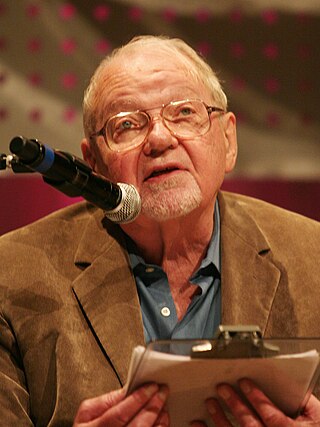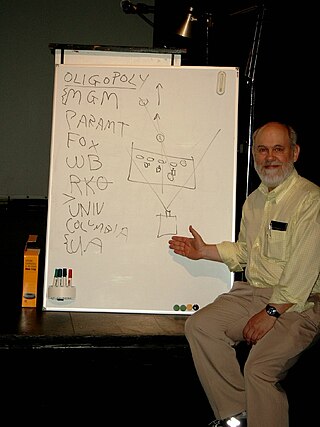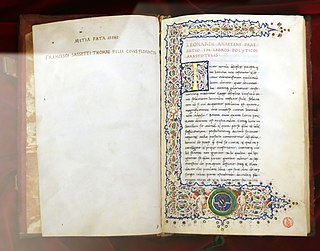Equilibrium may refer to:
Literary theory is the systematic study of the nature of literature and of the methods for literary analysis. Since the 19th century, literary scholarship includes literary theory and considerations of intellectual history, moral philosophy, social philosophy, and interdisciplinary themes relevant to how people interpret meaning. In the humanities in modern academia, the latter style of literary scholarship is an offshoot of post-structuralism. Consequently, the word theory became an umbrella term for scholarly approaches to reading texts, some of which are informed by strands of semiotics, cultural studies, philosophy of language, and continental philosophy, often witnessed within Western canon along with some postmodernist theory.
A genre of arts criticism, literary criticism or literary studies is the study, evaluation, and interpretation of literature. Modern literary criticism is often influenced by literary theory, which is the philosophical analysis of literature's goals and methods. Although the two activities are closely related, literary critics are not always, and have not always been, theorists.
In cognitive linguistics, conceptual metaphor, or cognitive metaphor, refers to the understanding of one idea, or conceptual domain, in terms of another. An example of this is the understanding of quantity in terms of directionality or the understanding of time in terms of money.

Fredric Ruff Jameson was an American literary critic, philosopher and Marxist political theorist. He was best known for his analysis of contemporary cultural trends, particularly his analysis of postmodernity and capitalism. Jameson's best-known books include Postmodernism, or, The Cultural Logic of Late Capitalism (1991) and The Political Unconscious (1981).
Aristotle's Poetics is the earliest surviving work of Greek dramatic theory and the first extant philosophical treatise to focus on literary theory. In this text, Aristotle offers an account of ποιητική, which refers to poetry, and more literally, "the poetic art," deriving from the term for "poet; author; maker," ποιητής. Aristotle divides the art of poetry into verse drama, lyric poetry, and epic. The genres all share the function of mimesis, or imitation of life, but differ in three ways that Aristotle describes:
- There are differences in music rhythm, harmony, meter, and melody.
- There is a difference of goodness in the characters.
- A difference exists in how the narrative is presented: telling a story or acting it out.
William Kurtz Wimsatt Jr. was an American professor of English, literary theorist, and critic. Wimsatt is often associated with the concept of the intentional fallacy, which he developed with Monroe Beardsley in order to question the importance of an author's intentions for the creation of a work of art.
Narratology is the study of narrative and narrative structure and the ways that these affect human perception. The term is an anglicisation of French narratologie, coined by Tzvetan Todorov. Its theoretical lineage is traceable to Aristotle (Poetics) but modern narratology is agreed to have begun with the Russian formalists, particularly Vladimir Propp, and Mikhail Bakhtin's theories of heteroglossia, dialogism, and the chronotope first presented in The Dialogic Imagination (1975).
Jonathan Culler is an American literary critic. He was Class of 1916 Professor of English and Comparative Literature at Cornell University. His published works are in the fields of structuralism, literary theory and literary criticism.

"Ars Poetica", or "The Art of Poetry", sometimes referred to as the "Epistula ad Pisones", or "Epistle to the Pisos", is a poem written by Horace c. 19 BC, in which he advises poets on the art of writing poetry and drama. The Ars Poetica has "exercised a great influence in later ages on European literature, notably on French drama", and has inspired poets and authors since it was written. Although it has been well-known since the Middle Ages, it has been used in literary criticism since the Renaissance.
Cognitive poetics is a school of literary criticism that applies the principles of cognitive science, particularly cognitive psychology, to the interpretation of literary texts. It has ties to reader-response criticism, and also has a grounding in modern principles of cognitive linguistics. The research and focus on cognitive poetics paves way for psychological, sociocultural and indeed linguistic dimensions to develop in relation to stylistics.

David Jay Bordwell was an American film theorist and film historian. After receiving his PhD from the University of Iowa in 1973, he wrote more than fifteen volumes on the subject of cinema including Narration in the Fiction Film (1985), Ozu and the Poetics of Cinema (1988), Making Meaning (1989), and On the History of Film Style (1997).

Cognitive rhetoric refers to an approach to rhetoric, composition, and pedagogy as well as a method for language and literary studies drawing from, or contributing to, cognitive science.
Darwinian literary studies is a branch of literary criticism that studies literature in the context of evolution by means of natural selection, including gene-culture coevolution. It represents an emerging trend of neo-Darwinian thought in intellectual disciplines beyond those traditionally considered as evolutionary biology: evolutionary psychology, evolutionary anthropology, behavioral ecology, evolutionary developmental psychology, cognitive psychology, affective neuroscience, behavioural genetics, evolutionary epistemology, and other such disciplines.

Poetics is the study or theory of poetry, specifically the study or theory of device, structure, form, type, and effect with regards to poetry, though usage of the term can also refer to literature broadly. Poetics is distinguished from hermeneutics by its focus on the synthesis of non-semantic elements in a text rather than its semantic interpretation. Most literary criticism combines poetics and hermeneutics in a single analysis; however, one or the other may predominate given the text and the aims of the one doing the reading.
Geocriticism is a method of literary analysis and literary theory that incorporates the study of geographic space. The term designates a number of different critical practices. In France, Bertrand Westphal has elaborated the concept of géocritique in several works. In the United States, Robert Tally has argued for a geocriticism as a critical practice suited to the analysis of what he has termed "literary cartography".

Reuven Tsur was a professor emeritus of Hebrew literature and literary theory at Tel Aviv University. He was born in Oradea (Nagyvárad), Romania. His mother tongue was Hungarian. Tsur died on September 6, 2021, at the age of 88.
Poetry is a form of literature.
In literary theory, literariness is the organisation of language which through special linguistic and formal properties distinguishes literary texts from non-literary texts. The defining features of a literary work do not reside in extraliterary conditions such as history or sociocultural phenomena under which a literary text might have been created, but in the form of the language that is used. Thus, literariness is defined as being the feature that makes a given work a literary work. It distinguishes a literary work from ordinary texts by using certain artistic devices such as metre, rhyme, and other patterns of sound and repetition.





